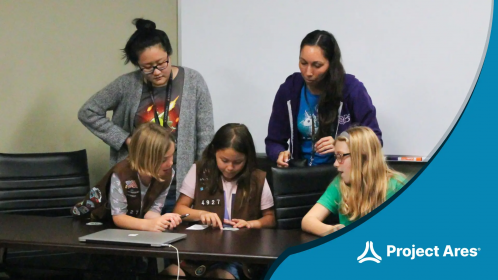Introducing girls to the world of cybersecurity and empowering their access to this STEM discipline is incredibly important to Circadence as we advocate for a cyber workforce with diversified thinking and problem-solving perspectives to keep pace with today’s adversaries. In mid-May, Circadence was honored to host 12 Brownies from a local Girl Scout troop at our San Diego office to help them earn their cybersecurity badges . Some of Circadence’s own family members are involved with the local troop and several co-workers facilitated a series of workshops for the girls to teach aspects of cybersecurity including cryptography, spamming, and virus detection.
Circadence’s Raeschel Reed, software engineer, taught the group about Cryptography and showed them how to use a Caesar Cypher to encrypt messages. The girls worked in groups of two to encrypt their favorite food and color. Then, they traded messages with each other and worked to decrypt the messages.
The group also learned about spotting fake emails and about using photo filters and editing pictures from Shirley Quach, Software Engineer at Circadence. Girls broke into groups and presented their comparison arguments for which photo was real and which was fake.
Yadhi Marquez-Garcia, DevOps engineer, taught a section about what a digital footprint is and how we should only share positive and not personal information. The girls wrote down all of the websites, games, and online services they interact with in order to learn about their own digital trail and “see” where they have been online. This helped them be much more conscientious and intentional about sites they visit online and the implications of their online activity.
Digital viruses and how they spread was another topic of discussion that included a hands-on activity. Domonique Lopez, office operations manager, led the girls through an exercise where they shook hands with as many people as they could in two minutes and then pulled a card out of a bucket. The girl who pulled the card out was deemed “the virus” and the other girls quickly realized they were likely “infected” because most had touched her either directly or indirectly. Domonique and the girls then discussed ways to limit exposure to viruses while online. The underlying lesson was that viruses can spread quickly if you aren’t careful about what websites you “shake hands” with.
Complementary to that topic, Kate Dionisio, software engineer, applied the concept of viruses to computer networks. She discussed about how malicious viruses are designed to disrupt computer systems and explained how ransomware attacks work. The girls gathered in a group and tried to pass a message from one to another (a game of “telephone”) while 3 disrupters shouted and tried to stop the message. Then they did the same thing but with 6 disrupters! This led into a discussion about how some viruses will overload a server with requests and stop messages from going where they need to go.
Finally, the girls formed teams of two to play inCyt , Circadence’s new cyber awareness game designed to help anybody learn basic cyber concepts similar to the ones that the troop had been learning about. Volunteers helped the girls understand how the cyber topics they’d been learning about applied to cyber attacks they were playing with on inCyt.
“When interacting with inCyt the girls were excited to get a chance to play a game. They loved picking their hackables and choosing a name. They got really excited when they were successful at sending a hack and loved the music. When talking with each other and volunteers they did a great job of connecting what they were doing with our discussions about digital trails and clicking suspicious links. I think they walked away more engaged than if we had just given them a lecture on the content,” said Domonique.
Circadence is pleased to host opportunities like this to engage the next generation and improve their cyber awareness. There is a significant cyber skills gap today and while these young girls won’t be entering the workforce soon, we hoped they learned that cybersecurity isn’t scary and is a field they could consider someday. In the meantime, we’re glad that they might be a little safer online.





